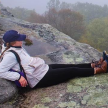
As an undergraduate student, specifically one who was involved in clubs and organizations, I never knew all of that would lead me to what I was passionate about. I have a degree in psychology and when I began my studies, I thought I was going to be a counselor or a therapist. Who knew that me becoming an Orientation Leader during undergrad would lead me to a career in higher education?
Now when I say I work in higher education – I work in Student Affairs. I am not a professor. I don’t work in a classroom, I work with programs that are co-curricular, which means that I provide other opportunities for students to learn outside of the classroom. Student Affairs covers areas in higher education such as: orientation, student activities, multicultural affairs/diversity, equity, and inclusion, career services, campus recreation, financial aid, residence life/housing, and so much more. When I told people I want to work in higher education they always asked, so what kind of professor would you be? So no, I’m not a professor, but I am still an educator.
Currently, I work with New Student Orientation (NSO) Programs and I am working on building a new Peer Mentoring Program, and a workshop series here on campus for first year students. The work I do is so important in higher education, because I work to help support students during their transition into higher education. Many of our new students have never lived away from home before (this is mostly our traditional, straight out of high school students), so the transition can cause a lot of anxiety. With my programs I can find ways to provide extra support to all new students.
I love my job because I get to learn while I work with students. I interact with college students daily and I love seeing how different each individual student is. With this in mind, I get to keep learning to work with different personalities, cultures, and overall types of students. Now, I am someone with many identities that are in the majority (cisgender, white, female), so learning from my students is one of my favorite ways to grow my awareness. Hearing about student experiences allows me to grow as a professional in finding new, innovative ways to help as many students as possible. Along with this, I’m in a position where I can use my privilege to help those who feel they don’t have a voice due to oppression. Learning from their experiences allows me to better understand the experiences of those with different identities than me and I can learn/adapt to the best way to help them.
I began this job February of 2021. I moved across the country (Pennsylvania to Colorado) by myself after a longer than anticipated job search due to the pandemic. Coming into a role in higher education during a pandemic was a little hard. We never knew what was going to happen in terms of safety guidelines, programming, etc. A lot of stuff was still taking place virtually, so this made meeting students, staff, and faculty difficult when I got here. However, when I did get those interactions, everyone welcomed me instantly. It made my transition a lot more comfortable and that was the energy I wanted to bring into my NSO program.
During NSO, which took place the end of August, we were hoping to have things as interactive as possible. The delta variant, however, had other plans. A week before NSO many of our plans had to change, but that didn’t stop me from finding ways for students to engage with the campus and other students. Our campus guidelines are currently that masks must be worn inside, but not outside. So, I moved most of our events outside and encouraged my student leaders to hold all their group meetings outside. That way students had the ability to continue to meet people and be active throughout the weekend.
As I walked around during each event, I really enjoyed seeing connections being made and hearing such great things from new students about their orientation experience. Anytime I hear the positive things that students have to say, they remind me of why I do what I do.
For NSO specifically, I love being able to see how people change from first meeting them to the end of the weekend. We had a few summer orientation days and I remember this one student who was so shy, barely said a word as she checked out at the end of the day. I saw her again as she checked in for fall NSO, her mother looked at me and said, “I remember you” and that made my morning. Sometimes I don’t think I make any sort of impact, but her mother remembering me reminded me that even the smallest of conversations can have an impact. At the end of NSO, this student opened up so much. I saw her speaking with so many faculty and other students during our faculty meet and greet event. We finished the weekend with a “Welcome Back Bash”. I saw our Vice President for Student Affairs stopped by. As I was speaking with him, this student who was so shy when I first met her walked up to us and introduced herself to him with ease. The growth I saw in that student just from that one weekend, helped me remember the benefits NSO has for students. I was so happy to see how much she has opened up and I cannot wait to see how she grows as a student here at our university.
Now let’s move on to the other part of my job: building a peer mentoring program and workshop series. This part of my job is all part of a grant to help build student retention – especially with our male black and Hispanic students. Unfortunately, they are our lowest population retained on our campus. Being the person to build this program does bring fear, and I’m hoping I can do our students justice.
I’m working with a great committee of staff and faculty from many different areas in hopes to help students learn as much as possible. Our workshops are covering topics such as mental health/stress management, time management, identity development, social justice, co-curricular engagement, financial literacy, and more.
This part of my job is to ensure that helping the transition doesn’t end after NSO. Students can get help throughout their first year, because this is the time where students are the most vulnerable and choose to transfer or drop out. While this can happen after the first year, it is most common during the first year. This program is to help students be retained by providing extra support and ways to learn some other things that are not taught within the classroom.
I don’t have too much to say about this other part of my job, because it hasn’t been fully built yet, but that’s also what I love about this job. I get to begin building the program and I’m so excited to see where it goes!
Part of Student Affairs in higher education is to provide support to students who may not have that depending on their background. Especially now, we see a lot of underrepresented populations of students and low-income students coming into college because access is somewhat (not completely) more available. My job not only is to support this transition, but I am here to help support students in a way that they need. Not all students accept support the same way, so I get to learn in how to adapt in helping these students. A lot of people tend to not understand what I do. My family just sees that I get to put on fun events and I get to do a lot of fun stuff, but in reality, it’s a lot more than that. What they don’t see is the endless hours of meetings, planning, trainings, and so much more. When I explain all of that, people ask me why do all that (especially when they hear the typical salary for a new professional like myself)? My answer is simple: students need support and help now more than ever. Not all support will look the same, some students find support in going to events, some find it in directly meeting with other students or the professionals in the field. Everyone I know that is in the field is in it for a reason: we want to support our student’s, we are here for our students.
Like I said, I never expected my involvement on campus in undergrad would lead me to a career in higher education. A bachelor’s and master’s later, I can truly say that I love what I do and I feel like I just began. Doing things that I loved being part of in undergrad and being able to provide support to students that may not have it really allowed me to find my purpose. This job provides me the satisfaction that I can impact student’s lives and I’m really grateful that I get to see their development over time.
About the Creator
SH
Sometimes I write to bring myself peace. If you read anything, thank you. I'm grateful.






Comments
There are no comments for this story
Be the first to respond and start the conversation.